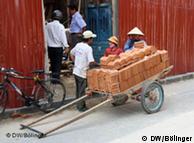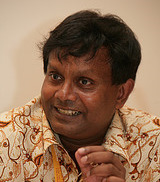Shedding light on the dark side of labor migration in Asia
 There are about 80 million migrant workers worldwide. We often hear that they have a positive impact on the global economy. For instance, 12% of Bangladesh’s Gross Domestic Product (GDP) is generated by citizens who work abroad in countries such as Bahrain, Saudi Arabia and Malaysia.
There are about 80 million migrant workers worldwide. We often hear that they have a positive impact on the global economy. For instance, 12% of Bangladesh’s Gross Domestic Product (GDP) is generated by citizens who work abroad in countries such as Bahrain, Saudi Arabia and Malaysia.
But researchers like Kalinga Seneviratne say that labor migration from Asia has many hidden problems.
Mr. Seneviratne is the head of research at the Asian Media Information and Communication Centre (AMIC) based in Singapore.
At the Deutsche Welle Global Media Forum in Bonn this summer, Kalinga Seneviratne and other experts discussed how the media can tackle issues pertaining to labor migration.
Talking to Deutsche Welle reporters, the award-winning journalist explains some of the problems migrant workers face, the challenges journalists encounter when reporting such stories and how the media can play a major role in promoting human rights.
Interview with Kalinga Seneviratne
Ramesh Jaura is the executive president of the Global Cooperation Council in Berlin. He agrees that the media can and should find ways to continuously inform the public about migrant and minority-related matters. Jaura is of Indian descent and has worked in Germany as a journalist for many years .
In this interview he describes some of the underlying social aspects of labor migration. And he names the challenges the media must overcome both in the West and in Asia to address them.
One example of how media can creatively distribute and channel migration issues into the mainstream more effectively is a theme-based audio network called Radio 1812.
This international project started in 2006. It draws its name from International Migrants Day, which is December 18th.
So far, 243 radio stations from 50 countries in four continents have participated. They range from community radio stations to national and international broadcasters.
In an interview with Deutsche Welle, the director of the project, René Plaetevoet, describes the main objectives of Radio 1812, which is currently trying to expand its network and broadcast more frequently.
Interview with René Plaetevoet
By Gabriela Degen/Deborah Friedman
Interviews conducted by: Anggatira Gollmer, Deborah Friedman and Mariya Ruettinger






